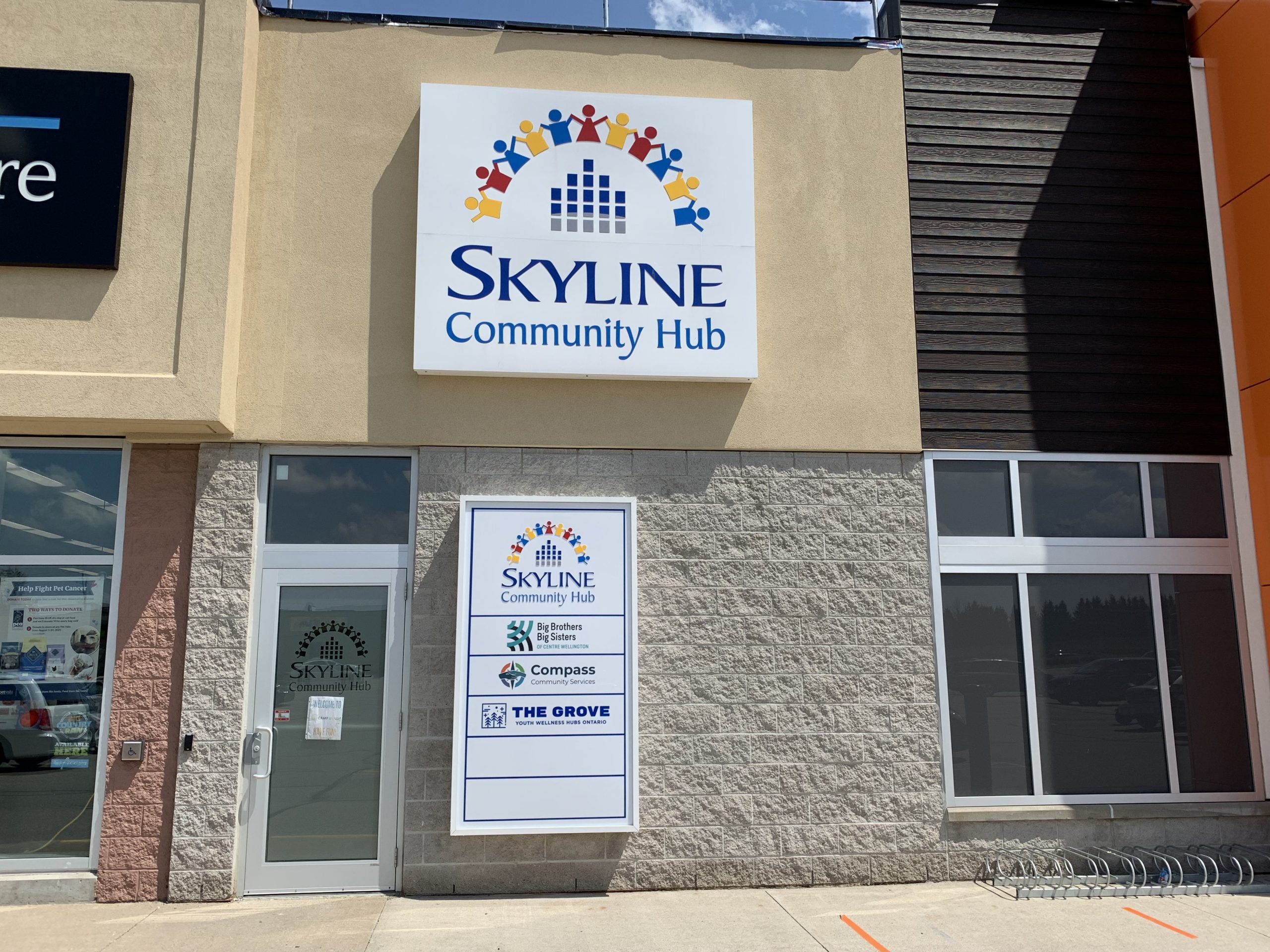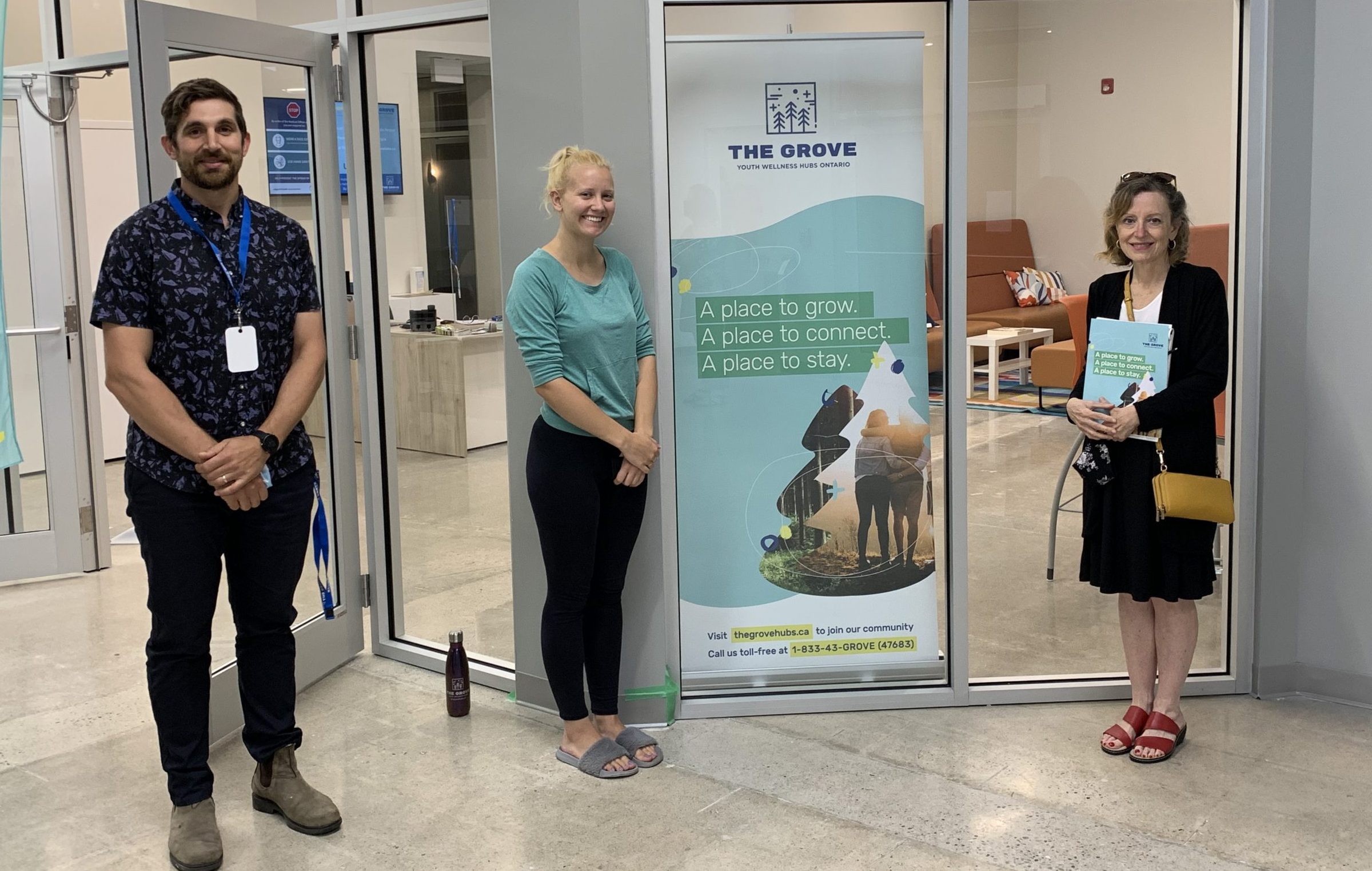WELLINGTON COUNTY – The Integrated Youth Services Network (IYSN) hubs in Wellington County have now become The Grove Youth Wellness Hubs Ontario.
“It’s a complete name change,” said Cyndy Moffat Forsyth, director of The Grove.
“The Integrated Youth Services Network was never supposed to be the final name. I called it that just so we could call it something, when it was a vision.”
Last winter, the organization brought together (virtually) a group of youth and had them brainstorm on different naming opportunities.
“We finally landed on The Grove,” Moffat Forsyth said.
The Grove operates three hubs in the county: in Fergus (900 Tower Street South), in Erin (10 Thompson Crescent) and in Palmerston (390 Main Street East).
The hubs are described as safe spaces where youth are empowered to take the lead in their own mental health and wellness journey.
Every hub allows youth aged 12 to 26 to drop in to connect with friends, as well as access mental health and addiction counselling, employment support, and peer-to-peer programs. All programs are designed by youth, for youth.
Moffat Forsyth said aside from the name change, everything about the organization remains the same.
“We’re a group of providers that have come together who want to transform the way services are provided for youth,” she added.
The hubs are funded through a number of community organizations and fundraising campaigns.
The Grove’s “partnership table” includes the Canadian Mental Health Association (CMHA), the Rotary Club of Guelph, the Guelph Community Foundation, Big Brothers Big Sisters, East Wellington Community Services, Minto Mental Health, Shelldale Family Gateway, the University of Guelph, and the YMCA.
“There are 30 different organizations involved in this,” Moffat Forsyth said.
“The way it is set up is that if a youth can access services at no charge from a community organization, then we welcome that community organization because we don’t want youth to be charged for services.”

The Grove’s youth hub in Fergus is located in the Skyline Community Hub. The space is shared by The Grove, Big Brothers Big Sisters of Centre Wellington, and Compass Community Services. Photo by Curtis Gordon
Moffat Forsyth said The Grove is currently in the middle of a $15-million fundraising campaign, and to date has raised $9 million.
She added the provincial government is providing long-term, sustainable funding as well.
Along with the three recently opened locations in the county, four additional locations will be opening in Guelph in the next two years, with the first site set to open at the University of Guelph this fall.
“They will welcome community youth, just like all the rest of the hubs will welcome University of Guelph students, so it will all be connected,” she said.
The other three sites will be located at the YMCA, Shelldale Family Gateway, and the new CMHA building that is currently being built in the north end of Guelph. The Grove will have 8,000 square feet of space for a youth hub on the main floor of that building.
Grand-opening celebrations
The Fergus location officially opened in July but will host a grand opening celebration later this month. The Grove shares the Skyline Community Hub space with Big Brothers Big Sisters of Centre Wellington and Compass Community Services.
“On August 25, we’re having a grand opening of the Skyline Community Hub,” Moffat Forsyth said.
“We’re going to celebrate the whole space. Skyline has done a tremendous amount of work in bringing this whole space to the community.”
Erin’s facility is under The Grove’s banner but is called Main Place Youth Centre.
“Erin was scheduled to open in April of 2020 but had to shut down. They opened for a little bit in the fall when we were allowed to, but we all had to sort of wait until June (of 2021),” Moffat Forsyth explained.
“They’re open now, but on August 19 from 4 to 7pm, Erin is hosting their grand opening at 10 Thompson Crescent.”
The Palmerston location officially opened in June and is just over 2,000 square feet in size. A grand-opening celebration there is planned for Sept. 23.

The Grove hub in Palmerston (formerly known as the Integrated Youth Services Network) is hosting a grand-opening celebration on Sept. 23. Advertiser file photo
Moffat Forsyth said Grove officials are expecting a “huge flood of youth” to access the youth hubs, once people become aware that they are open.
“We believe that there’s a tsunami coming in mental health, and especially with youth,” she said.
“It’s hard enough being an adolescent, and then you throw a pandemic in there where you’re isolated and you can’t see your friends and you can’t get the proper guidance, it just wreaks havoc on the best of us.”
Building trust
Moffat Forsyth emphasized that The Grove offers much more than just mental health services.
“We know that we need to build trust with youth. We’re not calling these mental health facilities,” she said.
“This is a warm, welcoming space, where youth can connect. They can hangout and charge their phone, or play a game of pool, dribble a basketball, or just hang out and get free food and a cup of coffee.”
Moffat Forsyth continued, “once we’ve developed the trust, if they want to access our (mental health) services, they’re here, they’re free, and there are very limited waiting times.”
Moffat Forsyth said the organization’s goal is for youth to not have to experience long wait times to access services, whether that be for resume writing help, seeing a nurse practitioner, or accessing mental health services.
“They shouldn’t have to wait any longer than 10 minutes, not 10 months,” she said.
Centralized strategy
The director also said it was important to ensure all Grove facilities were connected and centralized.
She said it can be difficult for youth to travel from one facility to another and share their story over and over again.
“The beauty of this model is you connect all of them. If a youth wants to walk into Erin, and then the next day walk into Fergus, with the youth’s permission, the site leads can pick up where they left off,” Moffat Forsyth said.
“The whole premise is to make this really easy for youth to bring accessible services to the rural communities, and to really focus on intervention and prevention.”



